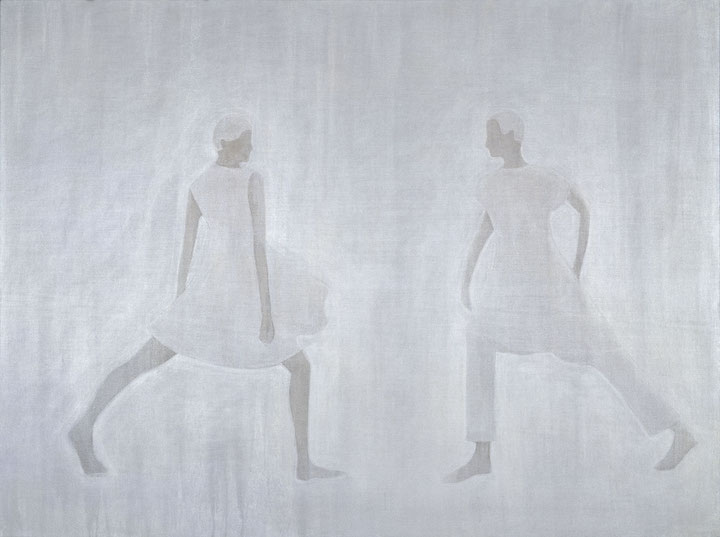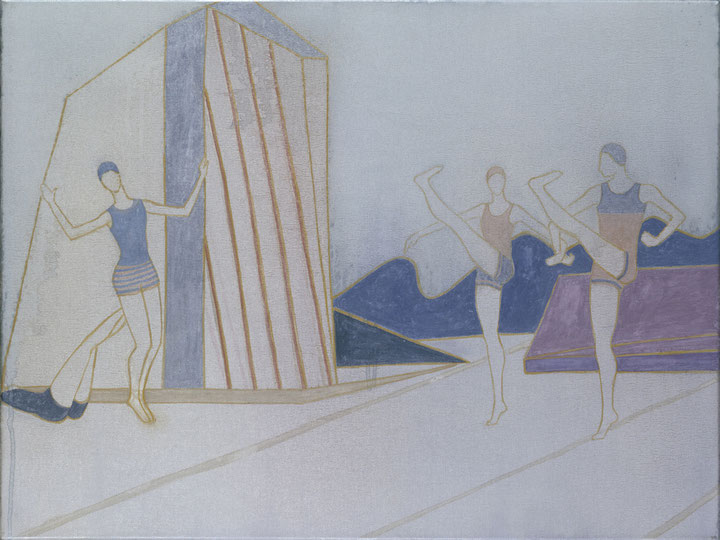Issue 4/2011 - Ware Freundschaft
The friendship dimension
Against the commodification of social relationships
1.
What does Facebook have to do with friendship? About as much as organised religion has to do with faith: not a lot. But try asking a Catholic leaving Sunday mass in a small village whether he believes in God. He’ll take the question as an insult, for after all he’s just come out of church. And you go there precisely so that no-one asks that very question. Especially not the neighbours. Instead you greet them warmly and talk about village business. Politics takes shape here in the shadow of something that provides an occasion and the requisite pretext for it (i.e. going to church) – a facade without which political exchanges in this form could simply not take place: if this were described openly as politics, those involved would be too inhibited, for they can only to act this way if they can pretend they are actually doing something entirely different. It’s a good thing people didn’t split hairs about the term friendship when friending everyone and their mother on Facebook in order to organise the uprising in Cairo.
In a sense perhaps today it is not so much the authenticity of emotions (such as friendship) that is endangered, but on the contrary what may be jeopardized is the perpetuation of the kind of lie traditionally essential to a subtle form of political exchange, attuned to the irreconcilable contradictions of the social realm: diplomacy. That becomes virtually impossible without a culture of pseudo-events, excuses for conversations and smokescreens. From the point of view of diplomacy, clarification becomes a kind of terror if it undermines the validity of what is only partly visible or addressed indirectly, torpedoing pretexts dreamt up for good reasons (all those aspects that link art and diplomacy); resolutely convinced to be doing the only right thing, such elucidation seeks to put an end to this spectre, violently dragging something out into the open that can only develop its society-changing potential when half-concealed. The contours of a scenario are emerging nowadays in which diplomacy is attacked by the global media machine, blindly following its own rules, for diplomacy, as a remnant of an older culture of communication, evades the grasp of those who would thrust everything out into the open.
The long-standing contract between the press and the world of politics (relating to matters treated as private) has now been severed, meaning on the one hand that figures like Strauss-Kahn or the Swedish king find themselves entering networks that they had previously been accustomed to ignoring. On the other hand, the damage an organisation such as WikiLeaks does to diplomacy – in other words, to public comprehension for the justifications for semi-transparent forms of communication – is potentially greater than the benefits arising from making available to a broad audience information that is anyway not really concealed. The image cultivated by Wikileak’s head, Julian Assange, also reproduces the classical caricature of the enlightener, who begins to resemble the devil (the hunger for power) he claims to be seeking to exorcise. In other words: if everything is to turned into information, made reformatable, transformed into zeroes and ones, diplomacy will resist, for its power to shape events (the art of avoiding wars) is rooted in the notion of talking to enemies as if they were friends and expressing important messages in purportedly innocuous statements, concealing ones behind zeroes or transforming them into zeroes once again, in order to avoid something much worse.
2.
In addition one notorious reason for misunderstandings in dealing with friendship and love in an era of global communication arises from the fact that anyone who has grown up in the romantic-idealistic cultures of old Europe views the pragmatic-entrepreneurial dimensions of cohabitation as something rather alienating (and is not keen to talk about it), whilst elsewhere, for example in the USA, although people do not admit too openly to this dimension, it does play a much more self-evident role in shaping intimate relationships. That does not mean that the US American »How are you?« might not be as friendly as it sounds. Its meaning must simply remain just as unclear as the response to that million-dollar question on the way back from church. That is the only way for the person addressed to subsequently negotiate whether it will be the dimension of friendship, of business, of politics, of intimacy - or none of the above - that will define how speakers in an interaction relate to each other.
The aspect that is however actually gaining the upper hand today is a culture of the purely performative in which social affects (such as friendship) are not so much experienced but rather paraded directly as social capital and converted into something akin to a currency: »And how many friends do you have on Facebook?« Another symptom of this is that moment, making small-talk at an exhibition opening, when someone exclaims at the mention of a high-status name »S/he’s a good friend!« and one can only transmit back on the same frequency: »Good for you!« The speed with which relationships are thus defined as capital has painfully little to do with the time that relationships would need to mature. Of course, one could take such phenomena as evidence of relationships that are becoming increasingly commodified, interpreting the general redesign of social life as a locus to produce profitable connections and the internalisation of the mechanisms of a new communication industry. That would not entirely miss the mark. However, it’s not doing friendship a favour simply to interpret the prevailing circumstances. And friendship does continue to exist. The challenge therefore is more how to develop concepts (and forms of interaction) to express esteem for all the ways in which friendship resists being trimmed to fit the notion of capital.
3.
In principle this resistance is one of the intrinsic qualities of friendship: it does not mean ownership. It does not belong to me, even if I experience it deeply. It is not up to me to determine that I am someone’s friend, and particularly not to define myself as a good friend. Whether that is the case is something that only my friends can say (just as, conversely, I can make similar statements about them). That means that between friends the friendship always »belongs« to the other party and hence belongs to all involved jointly and not to any specific individual. For that reason friendship is akin to humour and philosophy (even sharing semantic links with the latter). Just as they do, friendship eludes the calculations of wanting and owning. No-one can decide for themselves »I am humorous (or am the wisest of all). What I am going to say now is therefore funny (or philosophical)!« It is equally impossible to decide »Now I’m going to be a good friend to you!« A statement must first prove to be funny, in exactly the same way as one proves one’s mettle over time as a friend: in the way in which others experience us. Friendship, humour and philosophy only take on their full timbre in the way in which one’s own actions, speech, emotions and thinking resonate within the context of exchanges with others.
Seen in phenomenological terms, friendship is therefore not an object in the world (which one can take possession off, circulate as a commodity and accumulate as capital); instead it defines the bounds of the world. That means: in the light of friendship, the world looks different, it takes on a different hue, events are experienced differently. Often all it takes is an unexpected call, a willingness to listen, a few kind words or silly jokes, which could only come in this particular way from friends: and one’s own mood – previously trapped, oppressed within the constraints of the daily grind of work – suddenly takes a more positive turn. That feeling of bearing sole responsibility for knowing about your own life is eased for a moment when you realise – and this is so disarming and liberating – that the other person perhaps knows you much better than you know yourself. Without friends we would be prisoners to our moods. For often only our friends are able to bring about a decisive shift in our mood. The notion that friendship opens up a frame in which our view of the world changes in a fundamental, liberating fashion through exchanges with others – mood-shifting – is the point of departure for Deleuze and Guattari’s praise of the »philos«, the friend, as the boundary and precondition of philosophical knowledge: » Only friends can set out a plane of immanence as a ground from which idols have been cleared«. 1 Deleuze and Guattari refer to the »plane of immanence« to designate the aspect that draws a distinction between emancipatory thought and thinking rooted in faith in authority: it is distinguished by the fact that it does not invoke higher instances (in the world beyond), not setting up »idols« to evoke fear or summon up admiration; instead it remains »immanent« (in this world) and seeks to alter notions of the world within the bounds of experience in this world. Friendship becomes the frame within which a shared philosophical quest is conceived and experienced as an experientially immanent transformatory force.
This creed of experiential immanence thus comprises a rejection of the belief that authorities, instances and institutions might be able to determine the path to salvation and a fast-track to success, or that happiness might have anything to do with career progress. Referring to the increasing concentration of Prozac residues in London’s drinking water, Bifo Bernardi argues that a much greater degree of unhappiness becomes the norm if emotional self-exploitation emerges as the basic prerequisite nowadays for jobs that promise personal satisfaction in order to entice us into investing every last scrap of our personal energy and time into work.2 Referencing Deleuze and Guattari, Bernardi goes on to describe friendship as the realm of life in which happiness is possible, for it is not linked to labour as a promise of remuneration but is instead immanent as the potential of the relationship without having to be earned.
Paolo Virno arrives at similar conclusions, addressing the issue from a somewhat different angle. He notes that the individual is put under pressure on two fronts nowadays; through the imperative to market one’s own potential through »virtuoso«, highly individualised labour on the one hand, and on the other hand through the bureaucratic apparatus that evaluates this labour, issuing or refusing work visas, work permits etc. A precarious life thus becomes tantamount to negotiating a passage between Scylla and Charybdis. True support in effecting this passage, Virno writes, comes only from friends and he thus characterises the realm contained within the bounds of friendship as »the relations of solidarity that are established in the course of flight«.3 Deriving vanishing lines of the political from the realm of intimate co-existence certainly does entail running the risk that in the process public institutions will be stripped of the last shreds of trust invested in them, although actually today, as others argue, it would be important to struggle to preserve rights guaranteed by institutions.4 That is true. At the same time however (and this is not in contradiction to debates in the institutional sphere), recognising affective aspects of life in society as political forces has an indisputably positive effect, for it ensures that possible ways of designing and shaping the social sphere are not sought first and foremost in the institutional apparatus but are found instead in one’s own action and experience.
The strength of Hannah Arendt’s approach of deriving the political from particular forms of social life lies in precisely this consideration. Arendt cites the defining characteristic of what we have so far described as friendship – the moment in which perception of the other surpasses your own bounds – as the conceptual starting point for a political culture of free co-existence (modelled on the Greek »polis«). In Arendt’s view, the distinguishing feature of socio-political actions (as this concept was understood in Antiquity) is public self-disclosure by an individual acting vis-à-vis others, through actions but above all through language. The wonderful twist that Arendt gives to this thought lies in a decisive element that is rendered specific: what people acting in terms of socio-politics reveal to one another is something that cannot be controlled either consciously or knowingly, but which is displayed in their entire public persona and is thus first and foremost perceived through the way they are perceived by others. In the view taken in Antiquity, we do not see the Demon directing our actions, for he is pacing behind us, but other people recognise him, for he peers over our shoulder. Engaging in societal-political exchange signifies, as Arendt writes, taking a fundamental risk, »for no-one knows whom he is actually disclosing when he involuntarily discloses himself too in speech and action«.
5
Reflecting this, the point of departure for free coexistence in the »polis« lies, in Arendt’s view, in everyone’s willingness to concede that everyone else can see what you cannot see yourself. As anyone that turns to the public with this kind of willingness delivers themselves into the hands of others, they share and limit their power through this act. Arendt: »This revelatory quality of speech and action, whereby a speaker and an actor appears too, over and above their speech and action, actually only comes to the fore where people are with others and neither for nor against them – that is, in sheer human togetherness. [...] This risk of making an appearance as a someone together with others can only be assumed if one is prepared to exist in this togetherness in the future too [...]«. 6
This is an outline of a political ethics. However, at the same time Arendt is also proposing through this approach that the potential to give shape to free societal coexistence should be understood as something which in its form corresponds to friendship: for the potential of the social sphere accrues to everyone, for no-one possesses it in their own right and it can only take shape within the frame of exchanges with others. A political (intellectual, artistic …) culture, constituted in the spirit of this kind of friendship, would thus be a culture that never deployed the social sphere as a form of capital, setting it down in the accounts, but viewed friendship instead as an enduring challenge: to express solidarity and to deal (sometimes diplomatically, sometimes confrontationally) with the aspects of our existence which we know only others know about us and which therefore can only be transformed – retuned – in exchange with others.
Translated by Helen Ferguson
1 Gilles Deleuze & Félix Guattari, What is Philosophy?, London/New York, 1994, p. 43 translated by Hugh Tomlinson, Graham Burchell.
2 Franco ‘Bifo’ Bernardi, The Soul at Work. From Alienation to Autonomy. Semiotext(e), New York, 2009.
3 Paolo Virno: Virtuosity and Revolution: The Political Theory of Exodus, in: Paolo Virno/Michael Hardt (eds.), Radical Thought in Italy: A Potential Politics. Minneapolis, 1996, p. 205, cf. http://makeworlds.net/node/34.
4 In a workshop during the Caucus project in Cork in 2005, Chantal Mouffe raged in this spirit: »You can’t do politics with those Italian anarchists!«
5 Hannah Arendt, Vita Activa. Munich/Zurich, 2010, p. 220.
6 Ibid.




